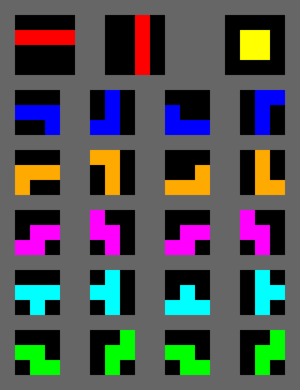Sega Rotation: Difference between revisions
*>NightmareciBot m Robot: Converting to new playfield syntax... |
m →Games |
||
| (11 intermediate revisions by 6 users not shown) | |||
| Line 1: | Line 1: | ||
'''Sega | [[Image:ARS-pieces.png|thumb|All rotation states of all seven tetrominoes. From top to bottom: I, J, L, S, T, Z. Top right: O.]] | ||
'''Sega Rotation''' is the [[rotation system]] used by [[Sega]] for [[Tetris (Sega)|Sega's 1988 ''Tetris'' arcade game]] and in subsequent releases until 1999's ''[[Sega Tetris]]''. Aside from Sega games, this rotation system was used as a basis for rotation systems in many other Japanese ''Tetris'' games, including the [[Arika Rotation System]] used in the ''[[Tetris The Grand Master (series)|Tetris The Grand Master]]'' series by [[Arika]]. | |||
== Basic rotation == | |||
Tetrominoes start out centered, rounding to the left. I goes in columns 4–7 counting from the left, O in columns 5–6, and others in columns 4–6. Each tetromino starts with its topmost solid block in row 20. | |||
Each tetromino is ordinarily spawned flat side up. There is no initial rotation and no wallkicks. Additionally, the ceiling prevents rotation. | |||
Apart from I and O, all tetrominoes rotate such that the bottom of the tetromino is at the bottom of the piece's bounding box. S and Z rotate between two states so that the center column stays constant. O does not rotate; I rotates between two states as depicted in the illustration. | |||
The differences between this and many other rotation systems are that the flat-side-down states of J, L, and T are pushed down by one space, that S and Z round in different directions, that I rounds differently from the other pieces, and that I requires more space under it to rotate to a vertical orientation. | |||
It originally did not utilize [[wall kick]]s. [[Arika]] took inspiration of this rotation system, adding mild wall kicks and initial rotation to their own rotation system. This modified rotation system is called the [[Arika Rotation System]] (ARS). In addition to the TGM series, most arcade games developed in Japan before the guideline followed the Sega rotation rules with varying degrees of wall kicks, such as ''[[Flash Point]]'', ''[[Bloxeed]]'', ''Sega Tetris'', ''[[Tetris Plus]]'', and ''[[Tetris Plus 2]]''. | |||
== Colors == | == Colors == | ||
Games using | Games using Sega Rotation generally uses the following color scheme: | ||
{| | {| | ||
| Line 49: | Line 61: | ||
|} | |} | ||
== | == Games == | ||
[[ | The following games use Sega rotation as their basic rotation: <!-- add more detail later --> | ||
*''[[Tetris (Sega)|Sega's arcade version of Tetris (1988)]]'' | |||
*[[Tetris (Mega-Tech)|''Tetris'' (Mega-Tech)]] | |||
*[[Tetris (Mega Drive)|''Tetris'' (Mega Drive)]] | |||
*''[[Flash Point]]'' | |||
*''[[Bloxeed]]'' | |||
*''[[Tetris Plus]]'' | |||
*''[[Tetris S]]'' | |||
*''[[Tetris Plus 2]]'' | |||
*[[Tetris The Grand Master series]] | |||
*''[[Tetris 64]]'' (when Rotation Center off) | |||
*''[[Sega Tetris]]'' | |||
== References == | == References == | ||
*[http://www13.plala.or.jp/TETRiS_TGM/kouza/index.htm TGM rotations, in Japanese] | *[http://www13.plala.or.jp/TETRiS_TGM/kouza/index.htm TGM rotations, in Japanese] | ||
[[Category:Rotation | {{Template:Sega games}} | ||
[[Category:Rotation systems]] | |||
Latest revision as of 01:53, 10 November 2023

Sega Rotation is the rotation system used by Sega for Sega's 1988 Tetris arcade game and in subsequent releases until 1999's Sega Tetris. Aside from Sega games, this rotation system was used as a basis for rotation systems in many other Japanese Tetris games, including the Arika Rotation System used in the Tetris The Grand Master series by Arika.
Basic rotation
Tetrominoes start out centered, rounding to the left. I goes in columns 4–7 counting from the left, O in columns 5–6, and others in columns 4–6. Each tetromino starts with its topmost solid block in row 20. Each tetromino is ordinarily spawned flat side up. There is no initial rotation and no wallkicks. Additionally, the ceiling prevents rotation.
Apart from I and O, all tetrominoes rotate such that the bottom of the tetromino is at the bottom of the piece's bounding box. S and Z rotate between two states so that the center column stays constant. O does not rotate; I rotates between two states as depicted in the illustration.
The differences between this and many other rotation systems are that the flat-side-down states of J, L, and T are pushed down by one space, that S and Z round in different directions, that I rounds differently from the other pieces, and that I requires more space under it to rotate to a vertical orientation.
It originally did not utilize wall kicks. Arika took inspiration of this rotation system, adding mild wall kicks and initial rotation to their own rotation system. This modified rotation system is called the Arika Rotation System (ARS). In addition to the TGM series, most arcade games developed in Japan before the guideline followed the Sega rotation rules with varying degrees of wall kicks, such as Flash Point, Bloxeed, Sega Tetris, Tetris Plus, and Tetris Plus 2.
Colors
Games using Sega Rotation generally uses the following color scheme:
| I: red |
| |
| J: blue |
| |
| L: orange |
| |
| O: yellow |
| |
| S: magenta |
| |
| T: cyan |
| |
| Z: green |
|
Games
The following games use Sega rotation as their basic rotation:
- Sega's arcade version of Tetris (1988)
- Tetris (Mega-Tech)
- Tetris (Mega Drive)
- Flash Point
- Bloxeed
- Tetris Plus
- Tetris S
- Tetris Plus 2
- Tetris The Grand Master series
- Tetris 64 (when Rotation Center off)
- Sega Tetris
References
| |||||||||||